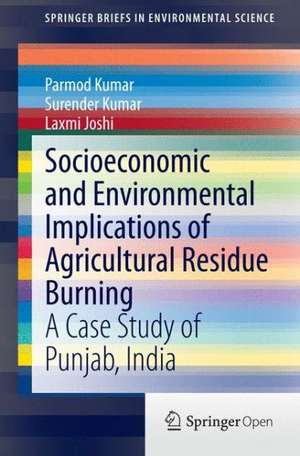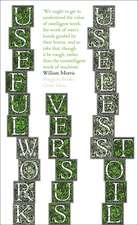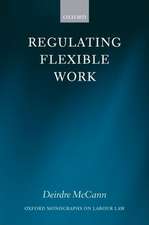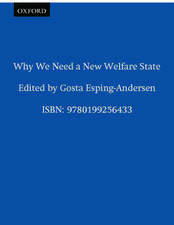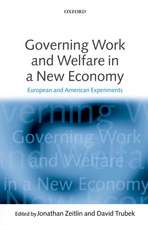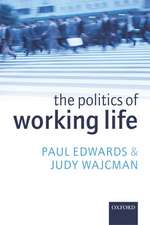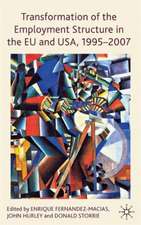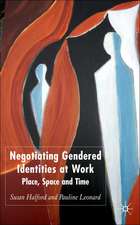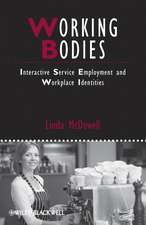Socioeconomic and Environmental Implications of Agricultural Residue Burning: A Case Study of Punjab, India: SpringerBriefs in Environmental Science
Autor Parmod Kumar, Surender Kumar, Laxmi Joshien Limba Engleză Paperback – 3 dec 2014
Din seria SpringerBriefs in Environmental Science
-
 Preț: 348.77 lei
Preț: 348.77 lei -
 Preț: 382.57 lei
Preț: 382.57 lei -
 Preț: 378.12 lei
Preț: 378.12 lei -
 Preț: 378.80 lei
Preț: 378.80 lei -
 Preț: 381.98 lei
Preț: 381.98 lei -
 Preț: 347.80 lei
Preț: 347.80 lei - 15%
 Preț: 464.18 lei
Preț: 464.18 lei -
 Preț: 378.12 lei
Preț: 378.12 lei -
 Preț: 377.53 lei
Preț: 377.53 lei -
 Preț: 379.09 lei
Preț: 379.09 lei -
 Preț: 381.00 lei
Preț: 381.00 lei -
 Preț: 383.93 lei
Preț: 383.93 lei -
 Preț: 175.58 lei
Preț: 175.58 lei -
 Preț: 475.83 lei
Preț: 475.83 lei -
 Preț: 380.07 lei
Preț: 380.07 lei -
 Preț: 378.92 lei
Preț: 378.92 lei -
 Preț: 411.93 lei
Preț: 411.93 lei -
 Preț: 375.62 lei
Preț: 375.62 lei -
 Preț: 375.45 lei
Preț: 375.45 lei -
 Preț: 378.92 lei
Preț: 378.92 lei -
 Preț: 377.57 lei
Preț: 377.57 lei -
 Preț: 377.35 lei
Preț: 377.35 lei -
 Preț: 378.34 lei
Preț: 378.34 lei -
 Preț: 344.67 lei
Preț: 344.67 lei -
 Preț: 374.30 lei
Preț: 374.30 lei -
 Preț: 362.43 lei
Preț: 362.43 lei -
 Preț: 446.26 lei
Preț: 446.26 lei - 5%
 Preț: 361.96 lei
Preț: 361.96 lei -
 Preț: 376.43 lei
Preț: 376.43 lei -
 Preț: 380.63 lei
Preț: 380.63 lei -
 Preț: 375.84 lei
Preț: 375.84 lei -
 Preț: 478.53 lei
Preț: 478.53 lei -
 Preț: 383.33 lei
Preț: 383.33 lei -
 Preț: 375.23 lei
Preț: 375.23 lei -
 Preț: 377.57 lei
Preț: 377.57 lei -
 Preț: 381.59 lei
Preț: 381.59 lei -
 Preț: 379.48 lei
Preț: 379.48 lei -
 Preț: 376.04 lei
Preț: 376.04 lei -
 Preț: 381.81 lei
Preț: 381.81 lei -
 Preț: 352.28 lei
Preț: 352.28 lei -
 Preț: 381.81 lei
Preț: 381.81 lei -
 Preț: 381.98 lei
Preț: 381.98 lei - 5%
 Preț: 331.65 lei
Preț: 331.65 lei -
 Preț: 375.62 lei
Preț: 375.62 lei -
 Preț: 377.95 lei
Preț: 377.95 lei -
 Preț: 413.45 lei
Preț: 413.45 lei -
 Preț: 267.16 lei
Preț: 267.16 lei -
 Preț: 373.72 lei
Preț: 373.72 lei -
 Preț: 375.62 lei
Preț: 375.62 lei
Preț: 413.84 lei
Nou
Puncte Express: 621
Preț estimativ în valută:
79.21€ • 82.37$ • 66.28£
79.21€ • 82.37$ • 66.28£
Carte tipărită la comandă
Livrare economică 15-29 martie
Preluare comenzi: 021 569.72.76
Specificații
ISBN-13: 9788132221463
ISBN-10: 813222146X
Pagini: 144
Ilustrații: XIX, 144 p. 5 illus.
Dimensiuni: 155 x 235 x 12 mm
Greutate: 0.24 kg
Ediția:2015
Editura: Springer India
Colecția Springer
Seria SpringerBriefs in Environmental Science
Locul publicării:New Delhi, India
ISBN-10: 813222146X
Pagini: 144
Ilustrații: XIX, 144 p. 5 illus.
Dimensiuni: 155 x 235 x 12 mm
Greutate: 0.24 kg
Ediția:2015
Editura: Springer India
Colecția Springer
Seria SpringerBriefs in Environmental Science
Locul publicării:New Delhi, India
Public țintă
ResearchCuprins
Chapter 1: Problem of Residue Management due to Rice Wheat Crop Rotation in Punjab .- Chapter 2: The Extent and Management of Crop Stubble.- Chapter 3: Valuation of the Health Impact.- Chapter 4: Alternative Uses of Crop Stubble.- Chapter 5: Environment Legislation in India as a Whole and in the State of Punjab.- Chapter 6: Policies for Restricting the Agriculture Residue Burning in Punjab.- Chapter 7: Concluding Remarks and Policy Implications .- References.- Annexure.
Recenzii
“The case of how the Punjab suffered from the environmental crisis and how it is raising its head again trying to achieve sustainable development of agriculture has been narrated in this very useful book, authored by Parmod Kumar, Surender Kumar and Laxmi Joshi. … The book is systematically structured with seven well informed and well written chapters. … The authors deserve to be complimented on producing an immensely useful study, which has clarity as well as depth.” (Mangesh V. Nadkarni, Journal of Social and Administrative Sciences, JSAS, Vol. 3 (2), June, 2016)
Notă biografică
Parmod Kumar is Professor and Head (Director), Agricultural Development and Rural Transformation Centre, Institute for Social and Economic Change, Bengaluru, India. He has previously worked at the National Council of Applied Economic Research, New Delhi and the Institute of Economic Growth, Delhi. He obtained his post-doctorate as Sir Ratan Tata Fellow from the Institute of Economic Growth and doctorate from Jawaharlal Nehru University, New Delhi. He was fellow under the International Visitors Program sponsored by the US government. Professor Kumar has authored six research volumes and published more than 40 research articles in refereed national and international journals. He is leading several research projects sponsored by the Government of India and various international organizations. He is the managing editor of the Journal of Social and Economic Change and is on the editorial board of Agricultural Situation in India and the Indian Journal of Agricultural Marketing. He is a member of various committees of the Union and state governments. Professor Kumar was conferred the IDRC India Social Science Research Award for his work on the public distribution system.
Surender Kumar is Professor at the Department of Business Economics, University of Delhi, New Delhi, and is one of the lead authors for IPCC AR5. He has been a Visiting Fellow at the University of Illinois at Urbana-Champaign (USA) and Senior JSPS Fellow at the Yokohama National University Yokohama (Japan). Professor Kumar has authored four books: Environmental and Economic Accounting for Industry (Oxford University Press, New Delhi); Economics of Sustainable Development: The Case of India (Springer, New York); Energy Prices and Induced Innovations (VDM Verlag); and Economics of Air Pollution (VDM Verlag); and about 50 research papers in journals such as the European Journal of Law and Economics, Ecological Economics, Economic Modelling, Environmental and Resource Economics, Environment and Development Economics, Resource and Energy Economics, etc. He teaches courses in environmental economics and advanced econometrics.
Laxmi Joshi works at the Department of Agriculture and Rural Development of the National Council of Applied Economic Research, India. She has previously worked at the National Centre for Agricultural Economics and Policy Research, New Delhi as Senior Research Associate, and in the National Commission on Farmers, New Delhi as Research Officer. She has published a dozen papers in different subjects, such as agriculture policy for farmers, diversification, watershed development, and so on. Her research has been published in the Indian Journal of Agricultural Economics, Economic and Political Weekly, International Water Organisation Colombo (research report on water), etc. She has also co-edited a volume on livestock and different farming systems.
Surender Kumar is Professor at the Department of Business Economics, University of Delhi, New Delhi, and is one of the lead authors for IPCC AR5. He has been a Visiting Fellow at the University of Illinois at Urbana-Champaign (USA) and Senior JSPS Fellow at the Yokohama National University Yokohama (Japan). Professor Kumar has authored four books: Environmental and Economic Accounting for Industry (Oxford University Press, New Delhi); Economics of Sustainable Development: The Case of India (Springer, New York); Energy Prices and Induced Innovations (VDM Verlag); and Economics of Air Pollution (VDM Verlag); and about 50 research papers in journals such as the European Journal of Law and Economics, Ecological Economics, Economic Modelling, Environmental and Resource Economics, Environment and Development Economics, Resource and Energy Economics, etc. He teaches courses in environmental economics and advanced econometrics.
Laxmi Joshi works at the Department of Agriculture and Rural Development of the National Council of Applied Economic Research, India. She has previously worked at the National Centre for Agricultural Economics and Policy Research, New Delhi as Senior Research Associate, and in the National Commission on Farmers, New Delhi as Research Officer. She has published a dozen papers in different subjects, such as agriculture policy for farmers, diversification, watershed development, and so on. Her research has been published in the Indian Journal of Agricultural Economics, Economic and Political Weekly, International Water Organisation Colombo (research report on water), etc. She has also co-edited a volume on livestock and different farming systems.
Textul de pe ultima copertă
This book discusses the important issue of the socioeconomic and environmental impacts of agricultural residue burning, common in agricultural practices in many parts of the world. In particular, it focuses on the pollution caused by rice residue burning using primary survey data from Punjab, India. It discusses emerging solutions to agricultural waste burning that are cost-effective in terms of both money and time. The burning of agricultural residue causes severe pollution in land, water and air and contributes to increased ozone levels and climate change in the long term. However, appropriate assessments have not been undertaken so far to demonstrate the relevant impact of agriculture-based pollution, especially residue burning. This book addresses this gap in the literature. Punjab has been used as a case study as it is the chief granary of India, contributing to 27.2 percent of the Indian national produce of rice and 43.8 percent of wheat. It is presumed that the findings fromthis state will be useful not only for other agricultural areas in India, but across the world. This book, therefore, sensitizes policy makers, researchers and students about the impacts of air pollution caused by agricultural residue burning---a subject not much dealt in the literature---and provides a way forward.
Caracteristici
One of the few volumes to discuss the impacts of agricultural residue burning Discusses cases of alternative disposal methods that are cost and time effective Sensitizes policy makers, researchers and students about the impacts of air pollution caused by agricultural residue burning Includes supplementary material: sn.pub/extras
